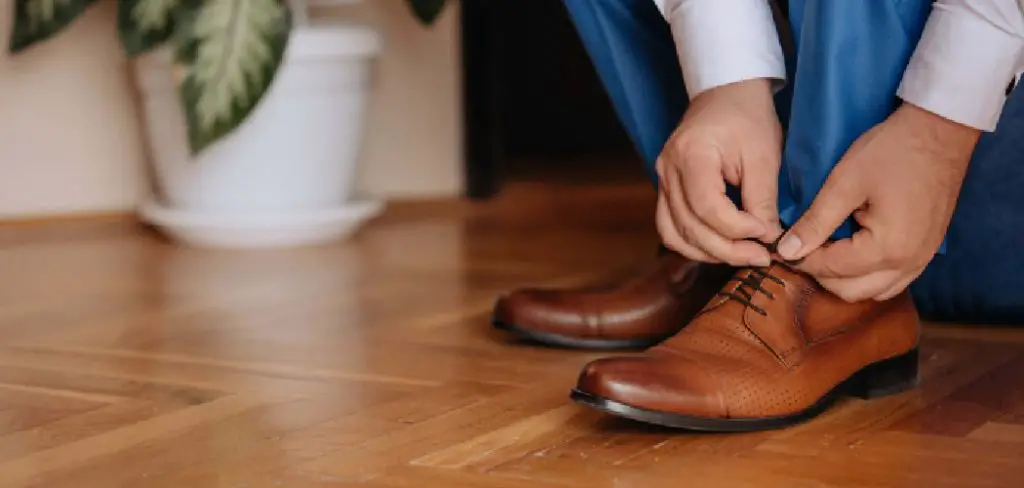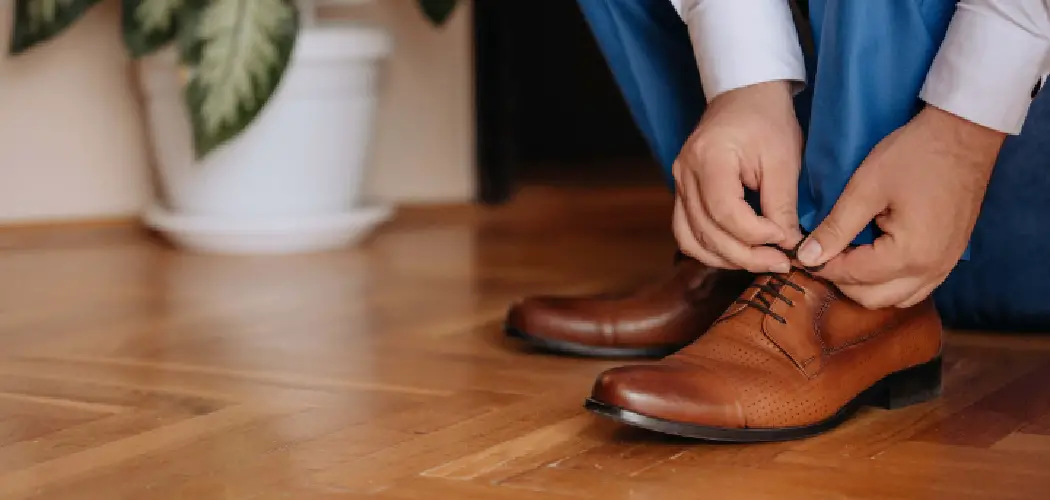To make shoes quieter, you can add cushioning inserts or use noise-absorbing insoles. By implementing these methods, you can minimize the noise caused by your footsteps.
Do you find the sound of your shoes echoing and drawing unwanted attention? If so, you may be wondering how to make your shoes quieter. Whether you have a pair of squeaky heels or loud sneakers, there are several simple solutions to help reduce the noise caused by your footwear.
We will explore effective methods that can make your shoes quieter, allowing you to stride in silence. Not only will this help prevent disturbances in quiet environments, but it will also give you a sense of confidence and comfort as you walk. Say goodbye to noisy shoes and say hello to peaceful steps with these easy-to-implement techniques.
Common Noise Issues With Shoes
When it comes to shoes, there are common noise issues that often frustrate wearers. Whether it’s squeaky soles or loud heels, these exasperating sounds can disrupt the peace and draw unwanted attention. Dealing with noisy shoes can be particularly bothersome in professional or formal settings, leading to embarrassment and discomfort. Fortunately, there are practical solutions to resolve these common noise issues and make your shoes quieter.
Squeaky Soles
Squeaky soles can be a major annoyance when walking, creating awkward and disruptive sounds. This common issue is often caused by friction between the insole and the shoe’s inner sole. To address this, you can:
- Remove the insole and apply a thin layer of baby powder or cornstarch to reduce friction.
- Insert padding or moleskin under the insole to dampen the noise.
- Apply a small amount of lubricant where the insole and the inner sole rub against each other.
Loud Heels
Loud heels can be a source of distraction and irritation, especially on hard surfaces. Whether it’s a clicking, clacking, or dragging sound, excessively loud heels can draw unwanted attention. Here are effective ways to address this issue:
- Attach rubber or anti-slip sole protectors to the bottom of the heel to reduce noise and provide better traction.
- Consider installing a heel cap or tip to minimize the impact of your footsteps.
- Opt for shoes with built-in noise-reducing features, such as cushioned and shock-absorbing soles.

Credit: www.facebook.com
Choosing The Right Materials
When it comes to making your shoes quieter, one of the key factors to consider is choosing the right materials. The materials used for the soles and insoles can greatly impact the noise level produced by your shoes. By selecting the appropriate materials, you can minimize the squeaking and clattering sounds that can often accompany walking. Let’s take a closer look at the sole materials and insole materials that can help make your shoes quieter.
Sole Materials
The sole of the shoe is the part that comes in direct contact with the ground. The choice of sole materials plays a crucial role in determining how much noise your shoes make. Opting for materials that have a good grip on different surfaces can help reduce the amount of friction between your shoes and the ground, thus minimizing noise.
Here are some sole materials that can make your shoes quieter:
- Rubber: Shoes with rubber soles are known for their excellent traction and noise reduction capabilities. The rubber acts as a natural shock absorber, dampening the impact and decreasing noise.
- EVA (Ethylene Vinyl Acetate): EVA is a lightweight and flexible material often used in athletic shoes. It provides cushioning and absorbs shocks, making your steps quieter.
- Crepe: Crepe is a natural rubber material known for its noise-reducing properties. It absorbs vibrations and prevents the shoe from making excessive noise.
By selecting a sole material that offers good shock absorption and grip, you can effectively minimize the noise your shoes make while walking.
Insole Materials
The insole is the inner part of the shoe that offers support and cushioning to your feet. The choice of insole materials can significantly impact the noise produced by your shoes. By opting for materials that reduce friction and absorb impact, you can achieve a quieter walking experience.
Here are some insole materials ideal for reducing shoe noise:
- Memory Foam: Memory foam is known for its comfort and ability to conform to your feet’s shape. It absorbs shocks and reduces friction, resulting in quieter steps.
- Gel: Gel insoles offer excellent shock absorption, making them helpful in reducing noise. Their soft and cushioning properties effectively minimize the impact noise created while walking.
- Cork: Cork insoles are another great option for reducing shoe noise. They are lightweight, provide excellent shock absorption, and reduce friction.
By choosing insole materials that prioritize comfort and shock absorption, you can ensure your shoes stay quiet and comfortable throughout the day.
Diy Fixes For Squeaky Shoes
If your shoes squeak, it can be annoying and embarrassing. Here are some DIY fixes to silence your squeaky shoes.
Powder Or Talcum
Using powder or talcum can help reduce the friction between shoe parts that cause squeaking.
- Clean the inside of your shoes.
- Apply a generous amount of powder or talcum inside.
- Distribute evenly and tap out excess before wearing.
Using Petroleum Jelly
Petroleum jelly can also act as a lubricant to eliminate squeaks in your shoes.
- Apply a small amount to the areas where friction occurs.
- Rub it in gently until absorbed.
- Wipe off any excess to avoid staining.
Professional Solutions For Noisy Shoes
Discover professional solutions to eliminate the annoying noise from your shoes and make them quieter. Find effective tips and tricks to ensure comfortable, noise-free steps throughout the day.
Shoes can be a source of annoying noise when they squeak or creak with every step. If you’re tired of the racket and looking for a professional solution, consider these options.
Shoe Repair Shops
When squeaky shoes are driving you crazy, a visit to a shoe repair shop can work wonders. Skilled cobblers are equipped to diagnose and fix the issue, whether it’s a loose sole or worn-out insoles.
Noise-reducing Inserts
Noise-reducing inserts are a simple yet effective fix for loud shoes. These discreet accessories can be placed inside your footwear to dampen the sound and provide extra cushioning for added comfort.
In addition to these solutions, consider investing in quality footwear that is less prone to making noise. Noisy shoes can be a thing of the past with the right maintenance and choice of products.
Maintaining Quiet Shoes
To keep shoes quiet, try applying a thin layer of rubber on the bottoms. Alternatively, insert cushioned insoles to reduce noise while walking. Maintaining quiet shoes is essential in minimizing distractions and maintaining a professional appearance.
Maintaining Quiet Shoes
Regular Cleaning
Regularly cleaning your shoes helps to reduce noise while walking.
Proper Storage
Proper storage prevents shoes from getting damaged and causing noise.
Avoiding Common Mistakes
When it comes to making shoes quieter, it’s essential to avoid common mistakes that can impact the effectiveness of your efforts. By being aware of these mistakes and taking proactive measures to avoid them, you can ensure that your shoe-related noise is minimized effectively.
Using Improper Lubricants
One of the common mistakes when trying to make shoes quieter is using improper lubricants. Applying the wrong type of lubricant can not only fail to reduce noise but also damage the shoe material. It’s important to use silicone-based or Teflon lubricants, specifically designed for reducing friction and noise. These lubricants provide a long-lasting solution without causing damage to the shoes.
Neglecting Wear And Tear
Neglecting wear and tear is another common mistake that can lead to noisy shoes. Worn-out soles and heels can contribute to squeaking and creaking sounds with every step. Regularly inspect your shoes for signs of wear and tear, and promptly address any issues. Replacing worn-out components or seeking professional repairs can significantly reduce the noise produced by your shoes, prolonging their lifespan as well.
Noise-free Shoe Shopping Tips
When it comes to shoe shopping, the last thing you want is to bring home a squeaky pair of shoes. Whether you’re navigating a quiet office or strolling through a serene park, noisy shoes can be a major nuisance. However, with some careful consideration and a few noise-free shoe shopping tips, you can ensure a more peaceful and enjoyable walking experience.
Test-walk In Store
One of the most effective ways to ensure your shoes are quiet is to test-walk them in the store. Take a few steps on different surfaces to assess if they produce any unwelcome noise. This gives you a first-hand experience of how the shoes sound and feel, allowing you to make an informed decision before making a purchase.
Selecting Quality Brands
When it comes to noise-free shoes, the brand matters. Quality brands often prioritize comfort and functionality, resulting in quieter footwear. Look for well-known brands that specialize in noise-reducing features, such as carefully crafted soles and high-quality materials. These brands have a reputation for producing shoes that are not only durable and stylish but also surprisingly quiet.

Conclusion And Final Tips
Learn how to make your shoes quieter with these final tips. Consider using cushioned insoles and applying baby powder to reduce squeaking. Tightening loose parts and adding rubber soles can also help minimize noise.
To make your shoes quieter, it is essential to embrace silence as an integral part of your daily routine. By following the strategies mentioned in this guide, you can significantly reduce the noise created by your shoes and enjoy a peaceful experience wherever you go.
Long-term Noise Prevention
Investing in noise prevention for your shoes can save you from ongoing inconvenience. Here are some long-term tips to keep your shoes quiet:
- Choose shoes with rubber or soft soles, as they tend to produce less noise on hard surfaces.
- Consider adding noise-reducing inserts or insoles to your shoes, which can dampen the impact and minimize noise.
- Regularly inspect your shoes for any worn-out parts, loose components, or broken heels, as these can contribute to increased noise.
Remember, prevention is key when it comes to keeping your shoes quiet, so make sure to take proper care of them by regularly cleaning and maintaining them.
In conclusion, by implementing these final tips and embracing silence, you can effectively reduce the noise produced by your shoes. Not only will this benefit those around you, but it will also create a more enjoyable and serene environment for yourself. So, go ahead and take action today!
Frequently Asked Questions For How To Make Shoes Quieter
How Do I Reduce The Noise In My Shoes?
To reduce noise in your shoes, try adding insoles or cushioned inserts for better support and shock absorption. Tightening laces and using anti-squeak powder can also help. Ensure shoes fit properly and aren’t too loose. Regular maintenance, like cleaning and ensuring no loose parts, can prevent noise.
Why Do My Shoes Make A Lot Of Noise When I Walk?
The noise may be due to loose soles or heels, worn-out insoles, or poor shoe construction. Regular maintenance can help reduce noise.
What Is The Solution For Loud Shoes?
To reduce loud shoes, try adding insoles or shoe inserts, opting for rubber soles, or seeking professional shoe repair.
How Can I Make My Shoes Quieter On Stage?
To make your shoes quieter on stage, you can try using rubber soles or adding foam pads to decrease noise. Another option is to wear socks or shoe inserts for sound absorption. Ensure shoes fit properly to minimize slippage and noise.
Conclusion
To sum it up, reducing shoe noise can significantly enhance your everyday comfort and minimize disruptions. By following these simple tips and tricks, such as using noise-absorbing insoles, wearing rubber-soled shoes, or incorporating padding, you can achieve quieter steps without compromising on style.
So, take a step towards quieter footwear and enjoy a peaceful stride in any setting.

